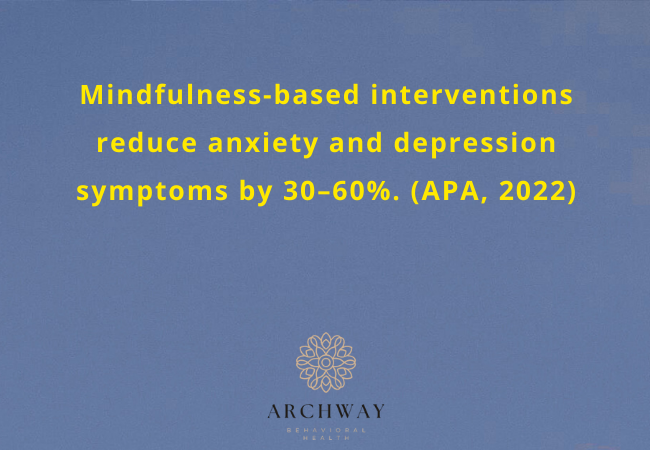In today’s fast-paced, overstimulated world, mental health challenges like anxiety, depression, emotional dysregulation, and trauma are more common than ever. For those struggling with overwhelming emotions, intense relationships, or impulsive behavior, Dialectical Behavior Therapy (DBT) offers a lifeline—and at the heart of DBT is one essential practice: mindfulness.
Mindfulness isn’t just meditation or relaxation—it’s a learnable skill that helps you find clarity, reduce emotional reactivity, and reconnect with the present moment. As one of the four core modules in DBT, mindfulness is foundational to everything else the therapy teaches.
At Archway Behavioral Health, we incorporate mindfulness into Individual Therapy in Florida, Group Therapy in Florida, and our structured programs like Partial Hospitalization Program (PHP) and Intensive Outpatient Program (IOP). This blog explores the science behind mindfulness, how it functions within DBT, and why it’s a life-changing skill for those seeking emotional balance and inner peace.
What Is Dialectical Behavior Therapy (DBT)?
DBT is an evidence-based form of psychotherapy created by Dr. Marsha Linehan for individuals who experience:
- Intense emotional reactions
- Suicidal ideation or self-harming behaviors
- Borderline Personality Disorder
- Mood disorders like bipolar disorder
- Trauma and PTSD
- Eating disorders and substance use
DBT combines cognitive behavioral strategies with acceptance and mindfulness practices, allowing clients to work on both changing harmful behaviors and accepting themselves without judgment.
DBT consists of four core skills modules:
- Mindfulness
- Emotion Regulation
- Distress Tolerance
- Interpersonal Effectiveness
Mindfulness is the foundation on which the other three are built.
What Is Mindfulness?
Mindfulness is the practice of intentionally paying attention to the present moment—without judgment, avoidance, or reactivity. It involves:
- Observing your thoughts, feelings, and physical sensations
- Describing your experiences without labeling them good or bad
- Fully participating in what you’re doing with awareness
Mindfulness is not about emptying your mind—it’s about noticing what’s happening inside and around you without being consumed by it.
Why Mindfulness Is Essential in DBT
In DBT, mindfulness is taught first because it supports every other skill. Without mindfulness, we react automatically—based on emotion, past trauma, or distorted thoughts. With mindfulness, we create space between emotion and reaction, giving ourselves the freedom to choose how we respond.
Mindfulness in DBT helps clients:
- Pause before reacting
- Increase self-awareness
- Observe internal experiences like urges or anger without acting on them
- Stay grounded in times of emotional overwhelm
- Build inner peace through nonjudgmental self-acceptance
Mindfulness in DBT: The “What” and “How” Skills
DBT breaks mindfulness into two categories:
The “What” Skills — What you do to be mindful:
- Observe – Just notice what’s happening, without reacting. Watch your thoughts, emotions, and surroundings like a curious scientist.
- Describe – Put words to what you’re noticing (“I feel tension in my chest,” or “I’m having the thought that I’m not good enough”).
- Participate – Fully engage in the current moment. If you’re walking, just walk. If you’re eating, just eat. Be all in.
The “How” Skills — How you practice mindfulness:
- Nonjudgmentally – Don’t label thoughts as good or bad. Just notice them. (“I’m noticing sadness” instead of “I shouldn’t feel this way.”)
- One-Mindfully – Do one thing at a time with your full attention. This builds focus and reduces mental chaos.
- Effectively – Do what works, not what you feel like doing. Let go of “right vs. wrong” and act in ways that move you toward your goals.
The Science of Mindfulness: How It Impacts the Brain
Mindfulness isn’t just spiritual—it’s biological. Studies show that regular mindfulness practice:
- Shrinks the amygdala, the brain’s fear and emotion center
- Strengthens the prefrontal cortex, responsible for executive functioning and emotional regulation
- Enhances connectivity in the default mode network, helping reduce rumination
- Increases gray matter in areas related to learning, memory, and empathy
As a result, mindfulness helps reduce:
- Anxiety and panic attacks
- Depressive episodes
- Emotional reactivity and anger outbursts
- Dissociation and avoidance behaviors
That’s why Archway integrates mindfulness across all levels of care—from individual therapy to group sessions and structured DBT programs.
How Mindfulness Is Taught at Archway Behavioral Health
Mindfulness is a core skill woven into every program we offer:
Partial Hospitalization Program in Florida (PHP)
- 5–6 days/week, 6+ hours/day
- Mindfulness skills taught in daily DBT groups
- Integrated into individual therapy and psychiatric sessions
- Mindful grounding exercises used to manage emotional crises and dissociation
- Ideal for clients needing intensive emotional support and structure
Intensive Outpatient Program in Florida (IOP)
- 3–5 days/week, 3–4 hours/day
- Weekly mindfulness skills groups
- One-on-one coaching on using mindfulness in real-life scenarios (e.g., during work stress or family conflict)
- Reinforcement through homework assignments and group sharing
- Best for clients transitioning from PHP or needing focused, flexible care
Individual Therapy in Florida
- Personalized mindfulness coaching
- Exploration of personal triggers and how mindfulness can interrupt reactive cycles
- Practice with grounding tools, body scans, and breathwork
- Clients with anxiety, bipolar disorder, or PTSD often find individual mindfulness sessions especially transformative
Group Therapy in Florida
- Collaborative mindfulness exercises
- Shared discussions on practicing nonjudgmental awareness
- Role-plays to apply mindfulness in relationships
- Helps reduce shame and increase self-compassion through shared experience
Real-Life Applications of DBT Mindfulness
In Anxiety Treatment:
Clients learn to recognize anxious thoughts as mental events—not truths. They observe the anxiety, breathe through it, and let it pass rather than reacting with avoidance or panic.
In Bipolar Treatment:
Mindfulness helps clients notice early signs of mood shifts and take preventive steps—without judgment or self-blame.
In Depression:
Mindfulness interrupts ruminative thought loops by anchoring clients in the present. “What’s happening now?” replaces “What went wrong yesterday?”
In Trauma:
Clients use grounding exercises to reorient themselves to safety when trauma memories arise. Instead of dissociating or reacting, they pause, breathe, and observe.
Examples of Mindfulness Exercises We Use
- 5-4-3-2-1 Grounding: Identify 5 things you see, 4 you can touch, 3 you hear, 2 you smell, 1 you taste.
- Urge Surfing: Ride out an urge (to self-harm, lash out, or use substances) without acting on it—like riding a wave until it passes.
- STOP Skill (Stop, Take a breath, Observe, Proceed mindfully)
- Wise Mind Practice: Balance between emotion mind and logic mind.
- Mindful Breathing: Count the breath, focus on sensations, return attention when the mind wanders.
Why Archway Behavioral Health Is the Right Place for DBT and Mindfulness
We’re more than a treatment center—we’re a healing community rooted in evidence-based care and whole-person wellness.
Why Choose Archway:
- Licensed therapists trained in DBT, CBT, trauma-informed care, and mindfulness modalities
- Integration of psychiatric services, therapy, and holistic practices
- Flexible, multi-level care: PHP, IOP, outpatient therapy
- Personalized support plans for anxiety, depression, bipolar, trauma, and more
- A warm, inclusive environment that promotes nonjudgmental growth
Whether you’re new to mindfulness or rebuilding after emotional chaos, we’ll help you master the skills that create calm, clarity, and control.
Ready to Find Peace Within?
Mindfulness isn’t about perfection—it’s about presence. Through DBT at Archway Behavioral Health, you’ll learn how to respond rather than react, to notice without judgment, and to find peace even in difficult moments.
Call us today at 888.488.4103 to schedule a free, confidential consultation. Let us help you quiet the chaos, center your mind, and step confidently toward lasting recovery.
Frequently Asked Questions (FAQ)
What is mindfulness in DBT?
Mindfulness in DBT is the practice of staying present in the moment, observing your thoughts and emotions without judgment, and acting intentionally rather than impulsively. It’s the foundation of all DBT skills and helps clients gain control over their reactions.
How is mindfulness taught at Archway Behavioral Health?
At Archway, mindfulness is integrated into Individual Therapy in Florida, Group Therapy in Florida, and our structured PHP and IOP programs. Clients learn mindfulness through guided exercises, real-world applications, and DBT-based skills training.
What are the benefits of mindfulness for mental health?
Mindfulness has been shown to:
-
Reduce symptoms of anxiety, depression, and trauma
-
Improve emotion regulation and stress tolerance
-
Enhance focus, self-awareness, and relationship quality
-
Support relapse prevention in long-term recovery
Can mindfulness help with anxiety and bipolar disorder?
Yes. In Anxiety Treatment in Florida, mindfulness helps reduce panic, worry, and avoidance. In Bipolar Treatment in Florida, it improves awareness of mood shifts and supports emotional balance and decision-making.



